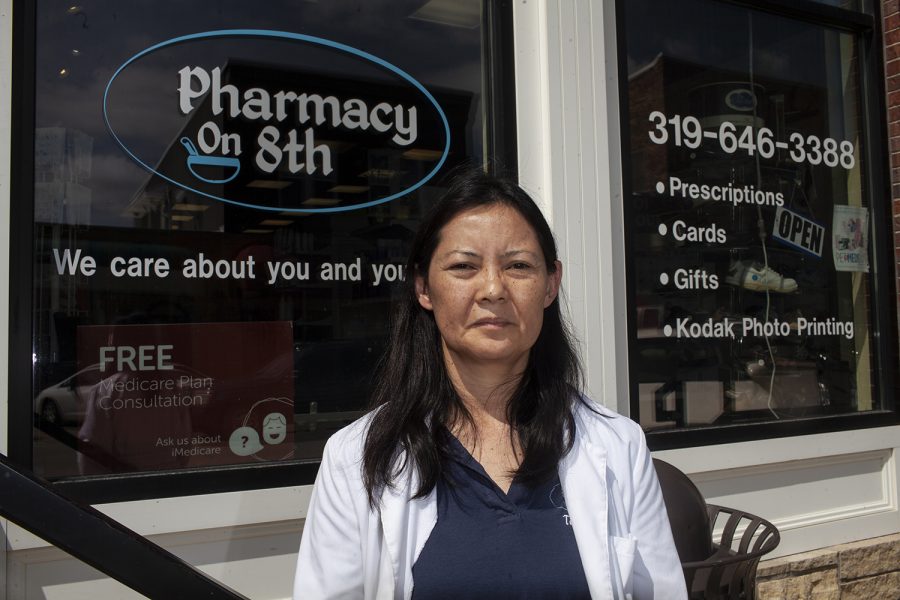Independent pharmacies shutting down, people left with few options
Research shows more than 16 percent of independent pharmacies shut down permanently between March 2003 and March 2018 in the United States. People living in rural areas are left with fewer options.
Pharmacist Tess de Jesus-Roetlin poses for a portrait in front of Pharmacy on 8th in Wellman Iowa, which she owns and operates, on Wednesday, Aug. 29, 2018. De Jesus-Roetlin says that the loss of local pharmacies in rural communities can create difficulties for patients in accessing their medication and information about treatment options, especially among elderly patients.
August 30, 2018
Research conducted by Center for Rural Health Policy Analysis at the University of Iowa suggests more than 16 percent of independent pharmacies shut down permanently between March 2003 and March 2018 in the U.S.
The Rural Health Center is a part of the Rural Policy Research Institute in the College of Public Health.
“We acquire data on a regular basis that tell us where all the retail pharmacies are in the country and whether they are a chain pharmacy like Walgreens or an independent pharmacy and have one outlet,” said Professor Keith Mueller, the senior author of the study.
Every year, a document is released that updates the number of pharmacies that have closed, he said.
Mueller said a big reason for the decline in rural independent pharmacies is the implementation of Medicare Part D in 2006.
Previously, patients paid pharmacies directly for their medication. With the introduction of Part D, however, he said, private insurance companies could negotiate prices of medication with pharmacies.
“When [this] program was initiated, it changed the finance dynamics for pharmacies,” Mueller said. “The end result of that was a contributing factor to a sharp decline in local rural pharmacies and the implementation of the program.”
The decline has continued since then; however, the pace has slowed, Mueller said. The issues pharmacies have also evolved.
“If you’re a large chain pharmacy, you might be able to absorb that, and, particularly if you’re a Walgreens, that’s keeping your business profitable and keeping your business in store,” he said.
There was an initial shock because of the change in revenue and business operations that came with dealing with insurance firms and their price structure, Mueller said.
“Our focus was on the closure of the only pharmacy in the area,” he said. “This isn’t a matter of a Walgreens or a CVS coming out and the local independent closing.”
That has occurred in Iowa, too, Mueller said.
“[However], because of our geography, it would not have the same effect as it would in North or South Dakota, where communities are smaller and farther apart,” he said.
No pharmacy in an area means people don’t have service for quite some distance, he said.
Coauthor Fred Ullrich said people living in rural areas can still get their pharmaceuticals on the internet; however, other services cannot be found.
“So, you don’t get things like blood-glucose monitoring, immunization, [and] counseling,” he said. “It’s an important [part], because if you are relying on mail-order pharmaceuticals, the people on the other side are really not paying attention to whether they all should be prescribed or used at the same time …”
Tess de Jesus-Roetlin, who owns Pharmacy on 8th, an independent pharmacy in Wellman, Iowa, said the establishment has seen a decline in sales because of Medicare Part D around 2007.
The pharmacy was started about 20 years ago; Jesus-Roetlin has run the pharmacy for five years.
The pharmacy gives flu shots and is trying to introduce screenings and diabetes and wellness education.
“We have a small volume, though,” she said. “Some people cannot go 15 miles to Iowa City. And they liked the service of a small business. Patients ask me questions, which is another thing that keeps me going.”




